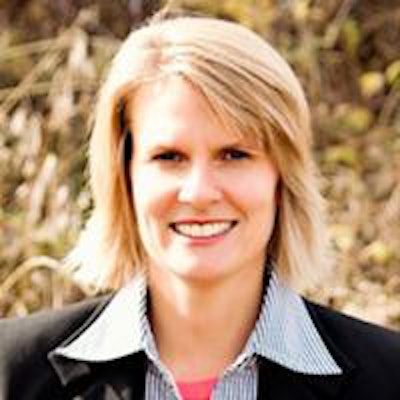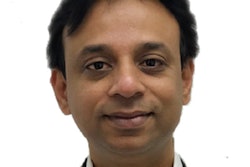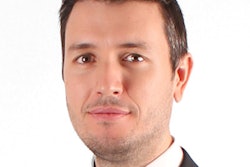
I handed my boarding pass to the gate attendant, and she looked at my carry-on bag.
"It looks too big," she said. "It cleared on the way here," I spoke sweetly -- not wanting to check my bag and wait for it to get unloaded in Detroit. She asked me to put it into the rectangular bag holder. I shoved it in there.
"If you have to shove it, you will have to check it." No breaks. I reluctantly checked my carry on bag after retrieving my laptop and my noise-reduction headphones. Slightly irritated, I boarded the plane with more gadgets in hand than desired.
 Lisa Knowles, DDS.
Lisa Knowles, DDS.We took off and the young man next to me swayed into the aisle, half asleep. Ironically, the woman next to me and I both had neck pillows. With guilt, we watched his head bob in and out of the aisle. As we landed, he woke up, and we started to chat about Detroit.
"It's so big," said Robert [not his real name] as he continually gazed out at the lit up miles and miles of urban sprawl.
"Yes, it is. What brings you to Michigan?"
"I am going to a place called [name removed]. I have a little pill problem," he explained.
I nodded, and wondered if I had crossed the stranger conversation line by asking. He explained his addiction to hydrocodone and how he started using pills for pain relief from a groin injury acquired while playing soccer. I knew I had not crossed the line. He openly talked about the answers to my questions.
In my practice of dentistry, I also often wonder if I cross the line with my questions to patients. Is it my business to ask patients about their mental health? What about their finances? Drug addictions? Bulimia episodes? These conversations feel uncomfortable. Yet, they are part of the whole, complete picture of each patient's life.
I wished my seatmate well on his journey and started to think about having to wait at the baggage claim area. It was midnight and I was ready to be home. As I emerged into the airport, gadgets still spilling out from every hand and pocket, I noticed my seatmate looking for a way out in the airport maze.
I slowed my "I am ready to be home" gait and walked with him to the baggage claim.
“As dental professionals, we can do our part to prevent pill problems.”
"Someone is supposed to be meeting me here to pick me up," he spoke nervously.
I envisioned someone holding a sign with his name on it, and I figured this person would be a little annoyed with a midnight pick up.
"Do you have any siblings?" I continued to ask him in polite conversation down the long, echoing terminal.
"Two younger sisters," he replied.
"You are the big brother," I said.
"Yes, I really screwed up. I am going to fix this. I am excited to go to this place."
He texted his mom while I thought about his three-month stay at this location.
I read the same USA Today article about the uptick in drug usage of heroin and deaths related to drug abuse that many of our patients have. According to the article, many heroin addicts start their substance abuse journey with the use of opiates. When they cannot get the prescription drugs, they switch to street drugs such as heroin. I shuddered when I read this article and thought, "Have I contributed to someone's drug addiction?" Probably not, because I am very stingy with my drug prescribing, but it is possible.
9 tips
In thinking about this issue, I want to offer nine tips for overcoming the temptation to prescribe too many pain relief pills:
- Use ibuprofen or other anti-inflammatories for pain relief as much as possible. Predosing with an anti-inflammatory an hour before a surgical case is common practice in many oral surgery offices.
- Sell the usage of anti-inflammatories to the patient. I cite cases that show similar outcomes when using Tylenol with Codeine No. 3 versus 800 mg of ibuprofen for pain management.
- If the surgical procedure, such as an extraction, was simple and straightforward, tell the patient it was simple and that you hope very little pain medication will be necessary. Plant the seed of little pain.
- Give limited quantities when opiates are needed. If I prescribe narcotics, I give four to eight pills for a single-tooth surgical extraction. If the surgery is simple, I typically only prescribe anti-inflammatories.
- Be mindful that drug addiction can happen to anyone. Watch for signs of abuse such as frequent requests for certain pain medications. Be suspicious when someone tells you only a certain kind of drug will work for him or her.
- Don't be lazy. Change the computer script manually. Just because the written template in the computer states 12 pills to dispense, change it and reduce it down to four or six as needed.
- Do not be intimidated by assistants who do not want to change the scripts manually. Have an assistant make several templated scripts for certain drugs so that during busy times, the easy and fast route will be the appropriate one.
- Resist the urge to do things the same way because you always have. If you typically prescribe 20 Norcos for a procedure, consider prescribing fewer. Be intentional, not robotic.
- Appreciate the need for pain medications when procedures are difficult, especially when bone removal or bone exposure occurs. However, continual requests for pain medications should be denied. Request a return visit from the patient so you can examine the area before multiple pain medication requests get fulfilled.
My young companion and I rounded the corner to baggage claim still walking side by side. We both saw his name on a sign at the same time. To my surprise, a friendly looking man held the sign that said, "Welcome, Robert." A sense of peace came over me; he would be going to a welcoming place.
At this moment, the personal enlightenment light went on about my checked bag. If I had held on to my anger over a silly baggage check issue, I would have missed this person. I am grateful for the opportunities I have to help others in my role as a healthcare professional. I get to ask the tough questions. I am privy to sensitive information, and I get to learn how to communicate effectively to help others when they need extra support -- sometimes in a dental office and sometimes in an airport.
Drug abuse is on the rise. Rural towns and urban meccas are dealing with this problem. As dental professionals, we can do our part to prevent pill problems like my seatmate Robert has. We can be aware of signs and symptoms of drug problems. We can ask difficult questions. We can change the way we prescribe drugs. We can be knowledgeable about substance abuse treatment centers. We can help. After all, we are treating the whole body -- the whole patient, aren't we?
Lisa Knowles, DDS, is the founder and CEO of IntentionalDental Consulting. For more information, contact her at [email protected] or 517-331-3688. Visit her blog site at Beyond32Teeth.com or website at IntentionalDental.com.
The comments and observations expressed herein do not necessarily reflect the opinions of DrBicuspid.com, nor should they be construed as an endorsement or admonishment of any particular idea, vendor, or organization.



















